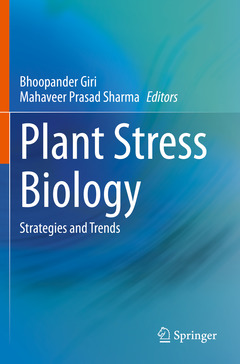Description
Plant Stress Biology, 1st ed. 2020
Strategies and Trends
Coordinators: Giri Bhoopander, Sharma Mahaveer Prasad
Language: English
Subjects for Plant Stress Biology:
Publication date: 02-2022
510 p. · 15.5x23.5 cm · Paperback
Publication date: 02-2021
510 p. · 15.5x23.5 cm · Hardback
Description
/li>Contents
/li>Biography
/li>Comment
/li>
Plants growing in the natural environment battle with a variety of biotic (pathogens infection) and abiotic (salinity, drought, heat and cold stresses etc.) stresses. These physiological stresses drastically affect plant growth and productivity under field conditions. These challenges are likely to grow as a consequences of global climate change and pose a threat to the food security. Therefore, acquaintance with underlying signalling pathways, physiological, biochemical and molecular mechanisms in plants and the role of beneficial soil microorganisms in plant?s stress tolerance are pivotal for sustainable crop production. This volume written by the experts in the stress physiology and covers latest research on plant?s tolerance to abiotic and biotic stresses. It elaborates on the potential of plant-microbe interactions to avoid the damage caused by these stresses. With comprehensive information on theoretical, technical and experimental aspects of plant stress biology, this extensive volume is a valuable resource for researchers, academician and students in the broad field of plant stress biology, physiology, microbiology, environmental and agricultural science.
Dr. Bhoopander Giri: Received his Ph.D in Mycorrhizal Research from the Department of Botany, University of Delhi in 2001. He has worked as a post-doctoral fellow at the Department of Plant Pathology, North Carolina State University, USA and is currently working as an Assistant Professor at the Department of Botany, Swami Shraddhanand College, University of Delhi, Delhi. He is a recipient of CSIR Research Associateship (2003), DST Young Scientist Fellowship (2005) and Raman Post-Doctoral Fellowship. Dr Giri has served as a General Secretary for International Symbiosis Society (ISS), USA. He is a life-member/member of many prestigious academic societies. Besides, he serves as a reviewer for several international and national journals, including Experimental and Environmental Botany, Planta, Applied Soil Ecology, Journal of Plant Growth Regulation, Agroforestry System, Colloids and Surfaces B: Biointerfaces, Scientia Horticulture, Acta Physiologia Plantarum, Spanish Journal of Agricultural Research, Journal of Experimental Botany, Plant Science Today, Institute for Life Long Learning, University of Delhi (e-content) and UGC-CEC pre-view subject expert. Dr. Giri has published more than 40 papers in the national and international peer-reviewed journals and books. He has presented research papers in several national and international conferences (Denmark, Switzerland, Canada, U.K and USA etc.) and also served as session chair and organizing secretary for a couple of conferences. Dr. Giri has edited a few books namely, Root Biology, Microorganisms in Saline Environments: Strategies and Functions, Biofertilizers for Sustainable Agriculture and Environment, and Soil Health published by Springer International Publishing AG-A Part of Nature.
Dr. Mahaveer P Sharma is currently working in Agricultural Research Service as Principal Scientist (Agricultural Microbiology) at Indian Institute of Soybean Research, Indore (Under ICAR (Indian Council of Agricultural Research)
Gathers most recent information on plant biology under biotic and abiotic stress
Brings together current advances in the molecular analyses of plant response to abiotic and biotic stresses
Compressively discusses the plant-microbe interactions in the rhizosphere for combating the impacts of physiological stress




